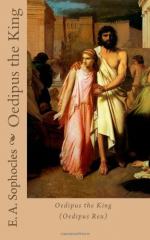|
This section contains 1,413 words (approx. 5 pages at 300 words per page) |

|
The Perfect Aristotelian Tragedy: "Oedipus the King"
Summary: The play "Oedipus the King" by Sophocles has all the ingredients necessary for a great Aristotelian tragedy. It contains the perfect Aristotelian tragic plot, consisting of paripeteia, anagnorisis, and catastrophe. It has the perfect tragic character that suffers from happiness to misery due to his tragic flaw. And the play evokes pity and fear that produces the tragic effect, catharsis (a purging of emotion).
Oedipus the King is an excellent example of Aristotle's theory of tragedy. The play has the perfect Aristotelian tragic plot consisting of paripeteia, anagnorisis and catastrophe; it has the perfect tragic character that suffers from happiness to misery due to hamartia (tragic flaw) and the play evokes pity and fear that produces the tragic effect, catharsis (a purging of emotion).
Oedipus the King has the ingredients necessary for the plot of a good tragedy, including the peripeteia. According to Aristotle, a peripeteia is necessary for a good plot. Peripeteia is "a reversal in his fortune from happiness to disaster" (Abrams 322). Oedipus's reversal of fortune occurs when he realizes that he is the son of Laius and Jocasta. The messenger comes to Oedipus assuming that he will relieve the King of the fear that he will kill his own father as predicted by the Oracle. But by revealing the...
|
This section contains 1,413 words (approx. 5 pages at 300 words per page) |

|


